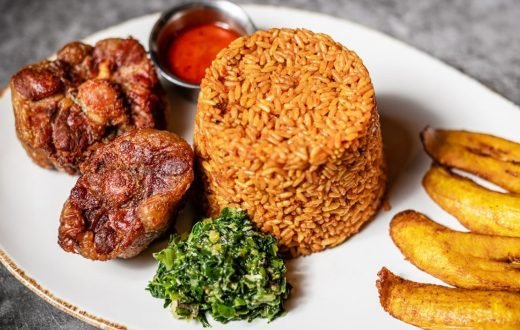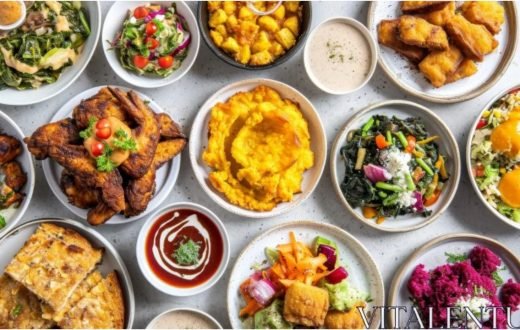Afro-Caribbean cuisine is a vibrant fusion of flavors, techniques, and ingredients, influenced by African, European, and indigenous Caribbean cultures. From spicy stews to flavorful rice dishes, the cuisine offers a rich culinary experience that is as diverse as its history. Whether you’re looking to explore Caribbean food for the first time or you’re a seasoned home cook, finding the right ingredients at an African store near me or an Afro Caribbean shop near me is the first step to creating authentic and delicious meals.
In this blog post, we’ll take an in-depth look at key ingredients in Afro-Caribbean cooking, their historical significance, and where you can source them from local African food shops or Afro Caribbean supermarkets near me.
The Afro-Caribbean Culinary Heritage
Afro-Caribbean food is a direct result of the African diaspora, particularly the transatlantic slave trade, which brought African people, traditions, and foodstuffs to the Caribbean. African ingredients like yams, cassava, and plantains became staples in the region, while new ingredients like sugar, spices, and tropical fruits were incorporated into African culinary traditions. The result is a cuisine that is bold, flavorful, and steeped in history.
If you’ve ever wondered what makes a dish like Jamaican jerk chicken or Haitian griot so distinctive, the answer lies in the unique blend of spices, cooking methods, and ingredients that have been passed down through generations.
Essential Afro-Caribbean Ingredients
Let’s explore some of the most important ingredients in Afro-Caribbean cuisine and how you can use them to recreate these traditional flavors at home. These ingredients can all be found at your local African food stores near me or Afro Caribbean shops near me.
1. Scotch Bonnet (Bonnet Scotch): The Heat of the Caribbean
One of the most iconic ingredients in Afro-Caribbean cooking is the scotch bonnet pepper, also known as bonnet scotch. This small, fiery pepper packs a punch, delivering both intense heat and a fruity flavor that enhances a wide variety of dishes. The scotch bonnet pepper is a key ingredient in Jamaican jerk chicken and Trinidadian pepper sauce, and it’s also used in many West African dishes.
Cultural Significance:
The use of scotch bonnet peppers in the Caribbean can be traced back to African culinary traditions. The heat from these peppers not only adds flavor but also has practical benefits—spicy food can help increase perspiration, which cools the body in hot climates. In both African and Caribbean cultures, the pepper is associated with communal meals and celebrations, symbolizing warmth and hospitality.
Where to Find It:
Visit an African shop near me or an Afro Caribbean shop near me to find fresh or dried scotch bonnet peppers. They can also be found in sauces and marinades, ready to spice up your dishes.
2. Plantains: A Versatile Staple
Plantains are a key ingredient in both African and Caribbean cooking. In Afro-Caribbean cuisine, they are used in a variety of ways—boiled, fried, or mashed—to accompany meats, fish, or beans. Maduros (ripe, sweet plantains) and tostones (twice-fried green plantains) are popular side dishes in many Caribbean countries like Cuba, the Dominican Republic, and Puerto Rico.
Nutritional Benefits:
Plantains are a rich source of complex carbohydrates, providing sustained energy. They are also high in fiber, vitamins A and C, and potassium, making them a nutritious alternative to potatoes or rice. Depending on their ripeness, plantains can be savory or sweet, adding versatility to your dishes.
Where to Find It:
Plantains are widely available in most African food shops near me or African superstores near me. Look for green plantains for savory dishes like patacones or dodo, and choose ripe, yellow plantains for sweeter dishes.
3. Coconut Milk and Oil
Coconut is a vital ingredient in Caribbean cooking, used in both savory and sweet dishes. Coconut milk is commonly used in Caribbean curries, stews, and rice dishes, while coconut oil is a popular cooking medium due to its rich flavor and health benefits.
Cultural Significance:
The use of coconut in Caribbean cuisine reflects the tropical environment of the region, where coconuts grow abundantly. In traditional Afro-Caribbean communities, the coconut has been used for food, drink, and even as a natural remedy. It’s also associated with hospitality, as sharing a coconut drink or dish is a common practice in many Caribbean cultures.
Health Benefits:
Coconut milk is high in healthy fats that support heart health and provide long-lasting energy. Coconut oil is also rich in medium-chain triglycerides (MCTs), which can help with fat metabolism and provide a quick source of energy for the brain.
Where to Find It:
You can find coconut milk, oil, and even fresh coconuts at most Afro Caribbean shops near me. These ingredients are essential for making dishes like Jamaican rice and peas, Trinidadian curry goat, or Haitian joumou soup.
4. Cassava (Yuca): The Root of Afro-Caribbean Cooking
Cassava, also known as yuca, is a starchy root vegetable that is a staple in both African and Caribbean diets. In the Caribbean, cassava is used to make dishes like bammy (a Jamaican flatbread) or cassava pone (a sweet dessert). In West Africa, it is commonly used to make garri or fufu, which are served alongside stews and soups.
Cultural Significance:
Cassava was introduced to Africa by Portuguese traders in the 16th century and has since become one of the most important food crops in the region. In the Caribbean, cassava was a staple food for indigenous peoples and was later adopted by African slaves who brought their own methods of preparation.
Health Benefits:
Cassava is rich in carbohydrates, providing energy for the body. It’s also a good source of dietary fiber, which aids in digestion. However, it must be cooked properly to remove naturally occurring toxins.
Where to Find It:
Cassava is available in both fresh and processed forms at most African food shops near me. You can buy cassava flour for baking or whole cassava for boiling, frying, or mashing.
5. Saltfish (Dried Cod)
Saltfish, or dried cod, is a key ingredient in many Caribbean dishes, including Jamaican ackee and saltfish, Trinidadian buljol, and Barbadian coucou. Saltfish was introduced to the Caribbean by European colonizers as a cheap, non-perishable source of protein for enslaved Africans, and it has since become a beloved part of Afro-Caribbean cuisine.
Cultural Significance:
In the Caribbean, saltfish is associated with resourcefulness and resilience, as it was used by enslaved people to create flavorful and nourishing meals despite limited resources. Today, it remains a symbol of the region’s culinary ingenuity.
Health Benefits:
Saltfish is a good source of lean protein and is rich in omega-3 fatty acids, which support heart health. However, it is also high in sodium, so it’s important to soak or boil the fish before cooking to reduce its salt content.
Where to Find It:
You can find saltfish at your local Afro Caribbean shops near me or African food store near me. It’s typically sold dried, and you’ll need to rehydrate it by soaking it in water before cooking.
The Role of Afro-Caribbean Shops in Preserving Culinary Traditions
Visiting an Afro Caribbean shop near me is not just about buying ingredients—it’s about connecting with the rich cultural traditions that have shaped Afro-Caribbean cuisine. These shops often carry a wide variety of spices, herbs, and specialty ingredients that you won’t find in mainstream grocery stores, allowing you to recreate authentic Afro-Caribbean dishes at home.
From scotch bonnet peppers to coconut milk, each ingredient carries with it a story of survival, adaptation, and creativity. The shopkeepers at these stores are often knowledgeable about the culinary uses of the ingredients they sell, and they may even share family recipes or cooking tips that have been passed down through generations.
Conclusion: Exploring Afro-Caribbean Cuisine with Ingredients from African Food Shops
The beauty of Afro-Caribbean cuisine lies in its ability to blend flavors, cultures, and ingredients into dishes that are both hearty and flavorful. Whether you’re making a spicy Jamaican stew or a sweet Caribbean dessert, the key to authentic Afro-Caribbean cooking is sourcing the right ingredients. By visiting local African food stores or Afro Caribbean shops near me, you can discover the vibrant flavors of the Caribbean and bring them to your own kitchen.
Don’t be afraid to experiment with new ingredients and cooking techniques. Afro-Caribbean food is all about creativity, and the possibilities are endless when you have access to fresh, traditional ingredients. So, take a trip to your nearest African food store near me, stock up on essentials like scotch bonnet peppers and cassava, and start exploring the rich culinary heritage of Afro-Caribbean cuisine.























